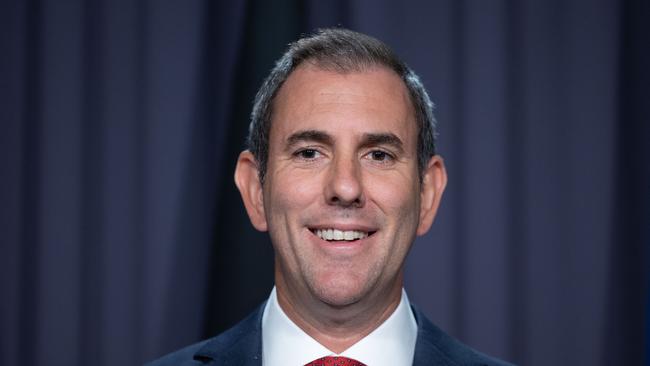
Jim Chalmers built a brand and a base, picked the brains of Labor stalwarts, networked like a demon in the finance industry and academy, and soaked up a mountain of information.
At his best, he’s a striver and a swot, naturally cautious, with a mind that seeks to join the random dots of politics and then make sense of the patterns.
Those who know him best in his role as Treasurer say he’s not a dot points executive, but a “give me everything” minister who consumes all the literature. “He’s a classic PhD, devouring everything in the brief, not a snacker,” says a colleague.
Chalmers now has his hands on the levers, accompanying responsibility, and status to influence outcomes, including a refresh of the machinery that pumps policy ideas his way.
What’s a man of the Queensland right doing messing with the market, especially after his political heroes Bob Hawke and Paul Keating laid the foundations for higher living standards via deregulations? The splashy “reinventing capitalism” treatise is multi-pronged: a rhetorical conceit to enlarge Labor’s project, a rallying cry for partisans, and an electoral ploy to get more voters onside, given two-thirds voted for someone else last May.
Behind the daily political battles and redundancies of opposition, most of today’s ministers maintained engagement with the latest social democratic ideas and thinkers, here and beyond our shores, and talked in private about what they might do if they got back to power.
One of the progressive scholars whose name came up time and again was Mariana Mazzucato, Italian-born, with US citizenship, a professor at University College London and one-time adviser to trainwreck British Labour leader Jeremy Corbyn. Mazzucato is a prima influencer in economics, much quoted and her advice prized, especially in industry policy and innovation.
In his new essay, the Treasurer lashes the dominant neoliberal “Washington Consensus” of free market economics that was pursued with varying degrees of success around the world, including with vigour from the 1980s in Australia by both major parties
“This school of thought assumed that markets would typically self-correct before disaster struck,” he writes.
“It’s clear now that the problem wasn’t so much more markets as poorly designed ones. Carefully constructed markets are a positive and powerful tool. As the influential economist Mariana Mazzucato has explored in her work, markets built in partnership through the efforts of business, labour and government, are still the best mechanism we have to efficiently and effectively direct resources.”
Chalmers hopes to tweak markets in climate finance, energy and social services, entice so-called “impact investors” into areas where there are limited markets, and make co-investments in social housing and manufacturing.
These are lean fiscal times, so Labor wants to leverage taxpayer funds into economic and social force multipliers. Mazzucato’s ideas on industry policy and innovation – simplistically, choose only the few things that you’re good at and go for it – have been picked up in the US and Britain.
It’s early days in Labor’s plan to be a fuller version of a “country that make things”.
Union leaders have been dazzled by Mazzucato for a decade, especially her The Entrepreneurial State (2013), which Anthony Albanese nominated as one of his favourite books in 2021.
Chalmers is proposing a radical change to values-based capitalism, but there are gaps, like a productivity agenda.
More than a unified theory, Jimonomics is a work in progress and positioning.
Albanese says to have enduring impact Labor needs a cascade of victories so reforms are not discarded to the scrap heap during lean times.




During the hungry years of political wilderness, Labor’s players sulked, read and wrote books, plotted, turned up for duty and found other therapies to deal with the Rudd-Gillard bloodlust and the trauma of 2019.